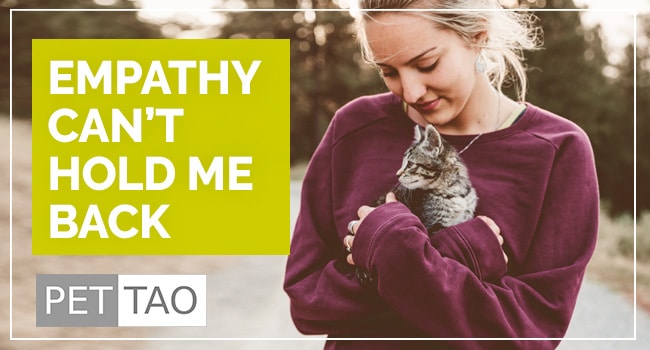Anecdotally, most people recognize empathetic responses in their pets.
If you have a pet, you’ve most likely already experienced animal empathy.
Maybe your dog lays by your feet when you’re not feeling well.
Perhaps your cat nuzzles your face when you’ve had a bad day.
Now, scientific research confirms animals ranging from pigs to horses not only feel empathy but can aid human healing.
Scientific Research Showing Animal Empathy
A growing number of scientists are researching animals’ response to human emotions.
Previously anecdotal, research now proves animals are highly intuitive and empathetic.
Piglets
A study reveals piglets previously placed in restraints become stressed seeing and hearing other piglets placed in restraints.
In the study, the observer pigs reacted more strongly observing their restrained pen mates than pigs without previous experience.
Animal Cognition published the research in Issue 3, Volume 19 of May 2016.
Horses
Research shows horses respond differently to people who smile or scowl.
According to the study, the first to show responses toward human emotion in animals other than dogs, horses presented with images of angry human faces displayed responses indicative of understanding.
These responses included a left-gaze bias, generally associated with negative stimuli, and an increased heart rate.
The Royal Society of Publishing published the study in February of 2016 in Biology Letters.
Dogs
In a study from 2014, researchers found dogs and people share similar responses to the sound of a crying baby.
For the study, researchers exposed humans and dogs to three sounds: a baby crying, a baby babbling and radio static.
Both humans and dogs responded neutrally to the sound of the babbling baby.
The radio static did not raise cortisol, a stress hormone, in people or dogs, but both expressed discomfort. The dogs’ body language included lowered heads, flattened ears, and lowered tails.
The sound of the baby crying caused increased cortisol levels in both humans and dogs.
Additionally, the dogs expressed submissive behaviors such as tucking their tails, which researchers believe represents low-level empathy.
Behavioral Processes published the study in Volume 108.
In another study, dogs expressed empathy for their canine partners.
Researchers used pairs of dogs who lived in the same household for at least a year.
Scientists separated the dogs at a testing facility.
One dog listened to the sound of its partner whining, a sign of stress, or an unfamiliar dog whining.
The dog pairs were then reunited.
After hearing both dogs whine, the listener dog had a higher cortisol level. But, the cortisol levels were higher after hearing their partner’s whines.
Additionally, after reunited the dogs, the pups displayed more intense greeting behaviors, demonstrating an understanding of their partner’s stress level.
PLOS One published the study in April 2016.
Service Dogs
Many people are aware of dogs’ capacity for understanding and empathy.
As such, dogs make excellent service animals.
For example, the K9s For Warriors program sets up veterans with service dogs.
The dogs are able to sense when the veterans become angry or anxious.
They will typically place a paw on their human’s foot, place their head in their lap, or stand with paws on their person’s shoulders.
These behaviors allow the veteran to remove himself from the situation and calm down.
Continued intervention gives the veterans increased freedom from medication and alleviation of pain and anxiety.
Cat Yoga
At Meow Parlour, a cat shelter and cafe in New York City, guests partake in yoga classes in a room with rescue cats.
Because the cats are unpredictable, the atmosphere of the yoga class is light, fun and relaxing.
Sometimes a cat will select one person to snuggle up to, bringing the particular attendee an added sense of comfort.
In a city with tiny apartments where pet ownership can be challenging, a cat yoga class brings much-needed animal time to those who may not be able to receive it at home.
Having pets, including cats, dogs, horses, and pigs, is a great addition to any lifestyle.
Animal lovers seeking a more holistic way to alleviate anxiety may want to consider a service animal.
Even those without health issues benefit from the tender love and affection of a furry friend.








